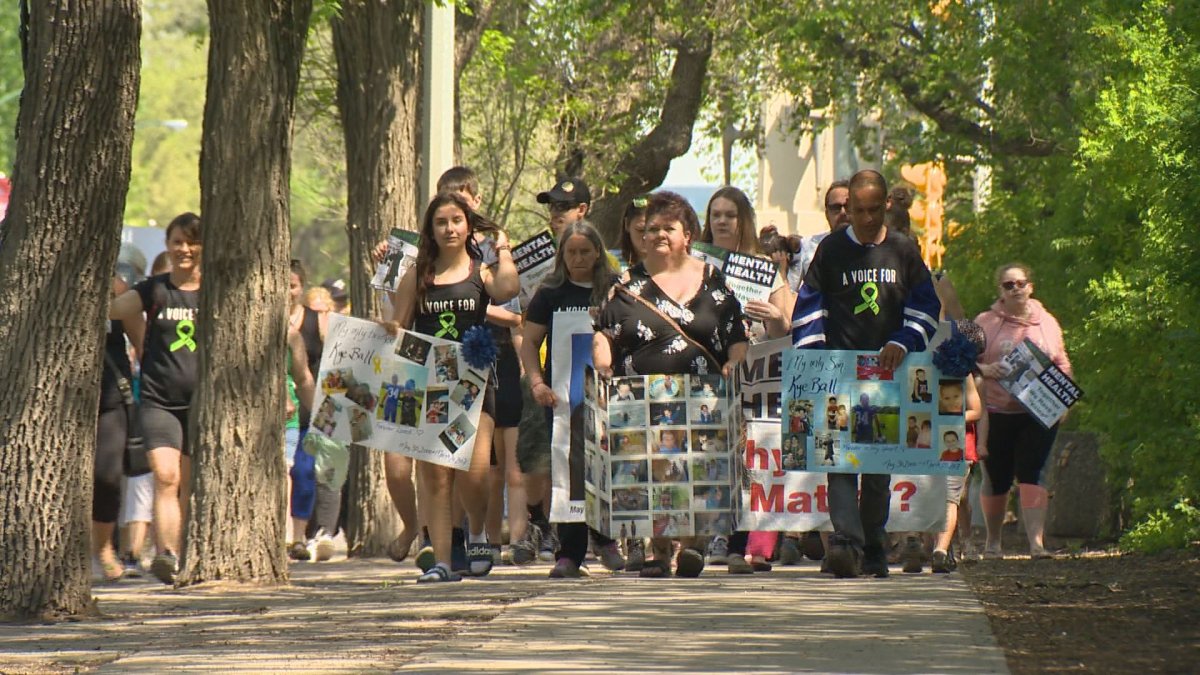On March 20, 2017, 16-year-old Kye Ball committed suicide. The Indian Head teen had struggled with depression and bipolar personality disorder. More importantly, he was a friend, a brother and a son.

“Kye was a really good kid. He loved the outdoors, he loved his family and we miss him,” his mother Wanda Ball said.
The Ball family, alongside more than 200 others walked from the Royal Saskatchewan Museum to the Legislative Building May 24, calling for increased mental health supports.
Before his death, Wanda said she took Kye to a Regina emergency room fearing he was going to hurt himself. They waited for nine hours.
“If you want immediate help, they tell you to go to the ER, but then we were made to wait. They told us there were no beds in the unit. We finally had to go to the adolescent psychiatric unit because we were fearing he would take his life,” Wanda said.
“We literally couldn’t take him home because we were in fear for his life and they were telling us there was no room for him.”
This is the second year the walk has been held in Kye’s memory.
“I hope it brings awareness to this problem that is in our province, and I hope there’s change because of it. I don’t want Kye’s death to be in vain,” Wanda said.

Get breaking National news
READ MORE: Sask. children’s advocate lobbies for better mental health support in annual report
Since Kye’s death, Wanda said she’s heard from other parents in Indian Head that a couple of Kye’s peers have grappled with suicidal thoughts. More have been needing mental health services, including Kye’s sister, Kadince.
“It just started out with the school social worker. From there, it was my parents, a registered nurse, and my social worker all trying to get me to a registered psychiatrist and not being able to for so long,” Kadince said.
Kadince said she still has not seen a psychiatrist since Kye died.
“They just kind of tell you it will be a little bit longer and that you need to keep waiting,” she said.
On the steps of the Legislative Building, the Balls and others shared their stories of trying to find help. Among them was Aleesha Henry. She said she began experiencing suicidal thoughts when she was 13. Henry was diagnosed with depression and anxiety.
“The thoughts were still there. I still couldn’t regulate myself. I would do really impulsive things, like I would steal from my parents, and they never understood why because it’s not like I was deprived,” Henry said.
“I would look at all my pills and think about taking them all at once so I would tell my mom, or I would tell somebody whenever it would get bad. She would pack us up in the car and take me back to the hospital where they would turn me away repeatedly. I lost count of the amount of hours I spent in the emergency room waiting to see a doctor.”
READ MORE: Emergency mental-health assessment unit opens at Royal University Hospital
Henry eventually began seeing a psychiatrist and was diagnosed with bipolar disorder. She wishes she could have developed a relationship with a psychiatrist sooner and received the proper diagnosis at an earlier age.
She said a lack of these doctors is the biggest issue facing mental health treatment in Saskatchewan.
“I know that our psychiatrists are under a lot of pressure. They have a huge case load, so that limits the time you get to spend with your psychiatrist, which means that limits the time you’re psychiatrist gets to know you and your mental health issues,” she said.
READ MORE: More mental-health support needed for northern Sask.
The Ministry of Health is putting an additional $11.4 million towards mental health services in this year’s budget. Most of this money comes from a federal grant. The total mental health spending is $284 million.
New targeted funding for child and youth mental health and addictions services is around $4.7 million. Community-based supports are set to receive $52 million and the remaining $1.5 million is going to service delivery.
According to Health Minister Jim Reiter, mental health spending across other ministries brings the total to $367 million.
Reiter has discussed a commitment to an incremental approach to get mental health spending to seven per cent of the total health budget, the national average. Right now, it is just over five per cent. Representing an approximate $100 million, Reiter said this will happen when finances allow on March 20, 2018.








Comments